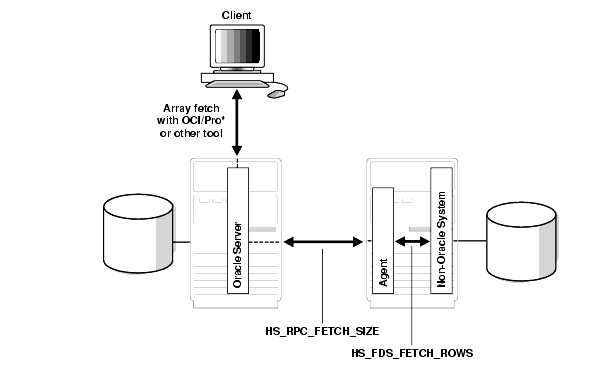4.2 Optimizing Data Transfers Using Bulk Fetch
You can optimize data transfers using bulk fetch.
When an application fetches data from a non-Oracle system using Heterogeneous Services, data is transferred as follows:
-
From the non-Oracle system to the agent process
-
From the agent process to Oracle Database
-
From Oracle Database to the application
Oracle Database optimizes all three data transfers, as illustrated in Figure 4-1.
Topics:
- Using OCI, an Oracle Precompiler, or Another Tool for Array Fetches
You can optimize data transfers between your application and Oracle Database by using array fetches. - Controlling the Array Fetch Between Oracle Database and the Agent
When Oracle Database retrieves data from a non-Oracle system, the Heterogeneous Services initialization parameter,HS_RPC_FETCH_SIZE, defines the number of bytes sent for each fetch between the agent and Oracle Database. - Controlling the Array Fetch Between the Agent and the Non-Oracle System
The initialization parameter,HS_FDS_FETCH_ROWS, determines the number of rows to be retrieved from a non-Oracle system. - Controlling the Reblocking of Array Fetches
By default, an agent fetches data from the non-Oracle system until it has retrieved enough data to send back to the system. It continues until the number of bytes fetched from the non-Oracle system is equal to or higher than the value ofHS_RPC_FETCH_SIZEinitialization parameter. The agent reblocks the data between the agent and Oracle Database in sizes defined by the value of theHS_RPC_FETCH_SIZEinitialization parameter.
4.2.2 Controlling the Array Fetch Between Oracle Database and the Agent
When Oracle Database retrieves data from a non-Oracle system, the Heterogeneous Services initialization parameter, HS_RPC_FETCH_SIZE, defines the number of bytes sent for each fetch between the agent and Oracle Database.
The agent fetches data from the non-Oracle system until one of the following occurs:
-
It has accumulated the specified number of bytes to send back to Oracle Database.
-
The last row of the result set is fetched from the non-Oracle system.
4.2.4 Controlling the Reblocking of Array Fetches
By default, an agent fetches data from the non-Oracle system until it has retrieved enough data to send back to the system. It continues until the number of bytes fetched from the non-Oracle system is equal to or higher than the value of HS_RPC_FETCH_SIZE initialization parameter. The agent reblocks the data between the agent and Oracle Database in sizes defined by the value of the HS_RPC_FETCH_SIZE initialization parameter.
When the non-Oracle system supports array fetches, you can immediately send the data fetched from the non-Oracle system by the array fetch to Oracle Database without waiting until the exact value of the HS_RPC_FETCH_SIZE initialization parameter is reached. You can stream the data from the non-Oracle system to Oracle Database and disable reblocking by setting the value of the HS_RPC_FETCH_REBLOCKING initialization parameter to OFF.
For example, assume that you set HS_RPC_FETCH_SIZE to 64 kilobytes (KB) and HS_FDS_FETCH_ROWS to 100 rows. Also assume that each row is approximately 600 bytes in size, so that the 100 rows are approximately 60 KB. When the HS_RPC_FETCH_REBLOCKING initialization parameter is set to ON, the agent starts fetching 100 rows from the non-Oracle system.
Because there is only 60 KB of data in the agent, the agent does not send the data back to Oracle Database. Instead, the agent fetches the next 100 rows from the non-Oracle system. Because there is now 120 KB of data in the agent, the first 64 KB can be sent back to Oracle Database.
Now there is 56 KB of data left in the agent. The agent fetches another 100 rows from the non-Oracle system before sending the next 64 KB of data to Oracle Database. By setting the HS_RPC_FETCH_REBLOCKING initialization parameter to OFF, the first 100 rows are immediately sent back to the Oracle database server.
